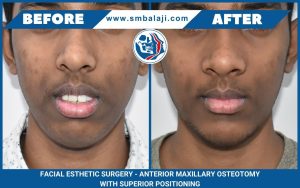[et_pb_section fb_built=”1″ _builder_version=”4.9.0″ _module_preset=”default”][et_pb_row _builder_version=”4.9.0″ _module_preset=”default”][et_pb_column type=”4_4″ _builder_version=”4.9.0″ _module_preset=”default”][et_pb_text _builder_version=”4.9.0″ _module_preset=”default” text_font_size=”16px” hover_enabled=”0″ custom_margin=”||0px||false|false” custom_padding=”||0px||false|false” sticky_enabled=”0″]
What is Pierre Robin Syndrome?
Pierre Robin syndrome is a disorder in which an infant has a smaller than normal lower jaw, a tongue that falls back in the throat, and breathing difficulties.
Causes
The exact causes of the Pierre Robin Syndrome are unknown. It is likely a part of a variety of genetic syndromes.
The lower jaw grows slowly before birth but can grow faster in the first few years of life.
Symptoms
Symptoms of this condition include:
- Cleft palate
- High-arched palate
- Jaw that is very small with a small chin
- Jaw that is far back in the throat
- Repeated ear infections
- Small opening in the roof of the mouth, which may cause choking or liquids coming back out through the nose
- Teeth that appear when the baby is born
- Tongue that is large compared to the jaw
Patient Returns for Tongue Lip Adhesion Reversal
This 10-month-old boy is from Chennai in Tamil Nadu, India. He was born with the classical signs of Pierre Robin syndrome. There were micrognathia, retruded tongue and cleft palate. Children with cleft palate have a hole in the roof of the mouth. His parents presented to our hospital for management of his birth deformities.
Treatment planning was first explained to the parents. They understood each surgery had to follow the planned schedule for the best results. Parents consented to the proposed treatment plan. Plastic surgeons also perform this surgery in countries like Japan and the US.
Retruded tongue position and micrognathia cause the tongue to fall into the throat. This would result in airway blockage by the tongue. He underwent tongue lip adhesion surgery a day after the presentation at our hospital. This surgery prevents the occurrence of stridor in Pierre Robin afflicted infants.
Characteristics of Airway Obstruction by Tongue
Stridor is the high-pitched breath sound arising from an obstructed airway. Infants with Pierre Robin sequence run the risk of airway obstruction by the tongue. Tongue lip adhesion surgery prevents this potential threat to the life of the infant.
Pierre Robin syndrome can develop from an abnormal intrauterine fetal neck position. Flexion of the developing mandible against the sternoclavicular joint can result in micrognathia. This could cause abnormal retrusion of the tongue.
The tongue pushes up against the developing palate causing nonfusion of the palate. This syndrome can also have a genetic basis for its development.
Specialty Center for Management of Cleft Deformities
Dr. SM Balaji, Oral and Maxillofacial Surgeon, has over 30 years of surgical experience. This includes cleft lip and palate surgery and craniofacial deformity surgery amongst others. Our hospital is also a specialty center for facial cosmetic surgery.
Many celebrities have undergone cosmetic nose surgery at our hospital. We are also a specialty trauma care center for facial fracture surgery. Our hospital also has a 24-hour ambulance service for facial trauma victims.
Our hospital is the Southeast Asian affiliate of the Dallas-based World Craniofacial Foundation. Students from Western dental schools request our hospital for observership opportunities. Many children with syndromic deformities get a new lease of life at our hospital.
Patients from all over the world come to our hospital to undergo corrective surgery. These include patients from developed regions like Europe, Japan and the US.
We have two dedicated states of art operating theaters in our hospital. Our nursing staff has over 20 years of experience in providing quality postoperative care. The lives of many afflicted children have undergone transformation here.
Cleft Palate Surgery followed by Tongue Release
The patient underwent cleft palate repair at 10 months old. A positive suction test denoted that there was optimal surgical correction.
He then underwent reversal of the tongue lip adhesion in two days. Delay of this surgery would lead to abnormal speech development. There was an uneventful recovery from both surgeries.
He was very lively and vocal throughout his postoperative stay. Tongue movement demonstrated the full range of motion. His parents were very happy with the results of the surgery. They expressed their gratitude to the hospital staff before final discharge.
[/et_pb_text][et_pb_text _builder_version=”4.9.0″ _module_preset=”default” hover_enabled=”0″ sticky_enabled=”0″ custom_margin=”0px||0px||false|false” custom_padding=”0px||0px||false|false”]
Surgery Video
[/et_pb_text][et_pb_video _builder_version=”4.9.0″ _module_preset=”default” src=”https://youtu.be/RCPbTpu8SFs” hover_enabled=”0″ sticky_enabled=”0″][/et_pb_video][/et_pb_column][/et_pb_row][/et_pb_section]





